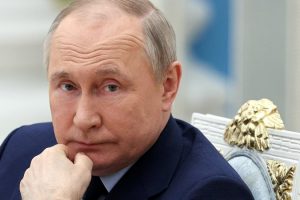Putin’s desperation on show as he slowly loses the financial battle

The simplistic take on events in eastern and southern Ukraine is that Russian troops have finally gained the advantage over their battle-weary, vastly outgunned opposite numbers.
The capture of Lysychansk, a key strategic city in the Luhansk region of the breakaway industrial Donbas republic by Russian forces suggests that Moscow has been able to grind down spirited resistance, as Western officials begrudgingly acknowledge.
We are seeing more evidence of Russia’s self-inflicted relegation from global superpower to international pariah.Credit:AP
On the other hand, Vladimir Putin is still a long way away from taking the whole of the Donbas region, with half of the Donetsk area still under the control of tens of thousands of Ukrainian troops, and fighting in the east taking a heavy toll on his army.
An unnamed Western official claims that Russia is experiencing “very serious issues” with munitions stocks and morale, while long-range weapons systems are starting to make a “significant operational difference for Ukraine”, The Guardian reports. The intelligence presents a very mixed picture.
Far clearer is the extent to which Russia is slowly losing the economic and financial battle as the conflict turns into a war of attrition and Western sanctions slowly bite. Even the protective blanket of Moscow’s vast energy resources seems to be weakening as military supplies run low.
New laws paving the way for Moscow to essentially mobilise the economy and the national workforce mark a serious turning point in events. There are two bills making their way through the Duma, Russia’s lower house of parliament.
The first gives the government powers to force businesses to contribute to the war effort. Authorities will be able to order factories to accept state defence contracts and redirect production towards military needs – vehicles, equipment, munitions and other vital hardware.
The second is just as extreme. Changes to labour laws hand the state the right to greater control over the workforce. Amid a shortage of specialist employees, officials will be granted powers to impose measures including night shifts, weekend and overtime work to enable businesses to fulfil the state’s needs.
It is truly interventionist stuff. The Kremlin had previously managed to avoid such measures thanks to the continued flow of billions of dollars a day in oil and gas revenues from the West at a time of soaring prices.
But as Europe steps up attempts to unhook itself from Russian reserves, the Kremlin is “preparing for the worst” because “soon all these revenues may run out,” Elin Rikova, economist at the Institute for International Finance, told the Financial Times.
It comes just days after the Kremlin unveiled £24 billion ($42 billion) of spending cuts over the next three years in anticipation of a severe recession. There have been many indications that Russia’s war is faltering. Moscow’s plan for a lightning quick victory was a comprehensive failure, forcing it to refocus its efforts on Luhansk and Donetsk.
Energy revenues continue to roll in for Russia but Moscow fears they will eventually be severely reduced.Credit:AP
But even there, despite advances, progress is exacting a heavy toll on the Russian army. Putin urged Defence Minister Sergei Shoigu to instruct troops who took part in the campaign to capture Luhansk to rest.
Russia grossly underestimated the determination and professionalism of the Ukrainian forces and the willingness of the West to arm Kyiv, while simultaneously being caught out by the shortcomings of his own troops.
With the Kremlin increasingly isolated from the international system, supplies are so strained that the Russian president has been reduced to issuing orders to the private sector to fix his broken and battered tanks. This is an admission that Moscow is critically short of the basic equipment and materials needed to fight a war, which in turn shows that it is unable to fight a war in the way that the West could.
It is an act of desperation that propels Russia back decades to the command economy of its Soviet past.
“The burden on the Russian defence-industrial complex has increased significantly”, deputy prime minister Yury Borisov conceded. The new bills talked about the “short-term increased need to repair weapons and military equipment and ensure supplies”. Perhaps most crucially, Russia has admitted for the first time that the impact of sanctions is beginning to be felt.
The new laws are “especially” essential because of the West’s attempts to cut-off the Russian regime, officials said.
With Moscow clearly attempting to regroup, Kyiv will hope that it allows enough time for vital Western weaponry to arrive, chiefly another scheduled shipment of M142 High Mobility Artillery Rocket Systems from America that have struck at the heart of Russia’s invasion.
Experts believe the highly accurate Himars launchers could help Ukraine turn the tide but only if deliveries are massively stepped up. Washington has so far provided four of the weapons, with another four on course to arrive before the end of the month.
Putin has suffered many humiliations in recent months but an attempted takeover of industry must top the lot, including its laughable attempts to revive the Moskvich car, a vehicle so terrible that it made the humble Lada look like a Maserati.
It is an act of desperation that propels Russia back decades to the command economy of its Soviet past.
Most significantly of all, it is further confirmation of Russia’s self-inflicted relegation from global superpower to failed third-rate state and international pariah.
Telegraph, London
The Business Briefing newsletter delivers major stories, exclusive coverage and expert opinion. Sign up to get it every weekday morning.
Most Viewed in Business
From our partners
Source: Read Full Article


